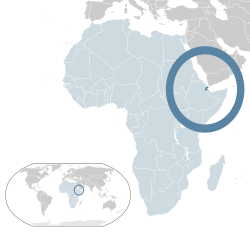Republic of Djibouti | |
|---|---|
| Motto: Midnimo, Sinnaan, Nabad (Somali) Inkittiino, Qeedala, Wagari (Afar) Unité, Égalité, Paix (French) اتحاد، مساواة، سلام (Arabic) Unity, Equality, Peace (English) | |
| Anthem: Djibouti | |
| Capital and largest city | Djibouti City 11°36′N 43°10′E / 11.600°N 43.167°E |
| Official languages | |
| National languages | |
| Ethnic groups | |
| Religion | 94% Islam (official) 6% Christianity |
| Demonym(s) | Djiboutian |
| Government | Unitary dominant-party presidential republic under a hereditary dictatorship |
| Ismaïl Omar Guelleh | |
| Abdoulkader Kamil Mohamed | |
| Legislature | National Assembly |
| Formation | |
| 12 May 1862 | |
| 20 May 1883 | |
| 5 July 1967 | |
Independence from France | 27 June 1977 |
| 20 September 1977 | |
| 4 September 1992 | |
| Area | |
Total | 23,200 km2 (9,000 sq mi) (146th) |
Water (%) | 0.09 (20 km² / 7.7 sq mi) |
| Population | |
2024 census | 1,066,809 |
Density | 46.0/km2 (119.1/sq mi) (168th) |
| GDP (PPP) | 2023 estimate |
Total | |
Per capita | |
| GDP (nominal) | 2023 estimate |
Total | |
Per capita | |
| Gini (2017) | medium inequality |
| HDI (2021) | low (171st) |
| Currency | Djiboutian franc (DJF) |
| Time zone | UTC+3 (EAT) |
| Calling code | +253 |
| ISO 3166 code | DJ |
| Internet TLD | .dj |
Table of Contents
Overview of Teacher Standards in Djibouti
The educational framework in Djibouti is meticulously designed to enhance the quality of education and ensure that teachers possess the necessary skills and knowledge to provide effective instruction. The standards set by the Ministry of Education outline the critical competencies expected from educators, reflecting the government’s commitment to improving the educational landscape in the country. These teacher standards serve as a foundational guideline to establish expectations for professional practice and student outcomes.
In Djibouti, teacher standards encompass a range of areas. This includes subject matter expertise, pedagogical skills, classroom management techniques, and the ability to adapt teaching styles to meet diverse student needs. Teachers are expected to demonstrate proficiency in their respective subjects, having a deep understanding of the curriculum and the ability to convey information clearly and engagingly. Additionally, educators are encouraged to engage in continuous professional development to stay current with educational practices and innovations.
The standards emphasize the role of teachers as facilitators of learning, highlighting the importance of creating an inclusive and supportive classroom environment. Effective teachers in Djibouti must foster a culture of respect and engagement, encouraging student participation and collaboration. Moreover, these standards advocate for the integration of technology and other resources to enhance learning experiences.
Furthermore, to be considered qualified and effective, teachers must meet specific certification requirements, which include educational qualifications and professional training. These criteria ensure that educators possess not only the theoretical knowledge but also practical skills necessary for a successful teaching career. By adhering to these standards, Djibouti aims to cultivate a cadre of well-qualified teachers who can significantly contribute to the educational advancement of the nation.
Teacher Qualifications in Djibouti
In Djibouti, teacher qualifications play a critical role in the educational framework, guiding the development of effective educators who can meet both local and international standards. The minimum educational requirement for prospective teachers typically includes a bachelor’s degree, preferably in education or a related field, from an accredited institution. This foundational degree is essential as it provides the necessary theoretical and practical knowledge required for efficient teaching.
Colleges and universities in Djibouti have taken significant steps to align their teacher training programs with regional educational standards. Many institutions now offer specialized coursework that covers subjects such as pedagogy, educational psychology, and curriculum development. These programs are designed to equip future teachers with the skills required to foster a conducive learning environment and address the diverse needs of their students. The emphasis on practical experience through teaching internships and student teaching initiatives is vital, as it allows candidates to apply their knowledge in real-world classrooms.
Additionally, proficiency in multiple languages, particularly French and Arabic, is increasingly becoming a prerequisite for teachers in Djibouti. This is due to the multicultural and multilingual nature of the student population. Furthermore, ongoing professional development is encouraged, ensuring that educators stay updated with the latest educational trends, teaching methodologies, and certification requirements. By mandating these qualifications and supporting continuous education, Djibouti aims to enhance its educational standards and improve the overall quality of its teaching workforce.
The commitment to meeting both national and international benchmarks for teacher qualifications is critical for the advancement of education in Djibouti, as it holds the potential to positively impact student outcomes and contribute to the broader socio-economic development of the country.
Licensing Exams for Teachers
The process of obtaining a teaching license in Djibouti requires candidates to successfully pass various licensing exams, which serve as a fundamental step in the certification process. These assessments are designed to ensure that teachers possess the necessary knowledge and skills to effectively educate students. Candidates must demonstrate competency in several content areas, including pedagogical theory, subject-specific knowledge, and assessment strategies.
The licensing exams typically consist of a combination of multiple-choice questions, short answer formats, and in some cases, practical assessments. The examination format is designed to evaluate both theoretical and practical understanding, ensuring candidates can apply their knowledge in real classroom settings. Furthermore, the exams assess critical areas such as child development, instructional planning, classroom management, and educational technology. Success in these exams is crucial, as they gauge the candidate’s readiness to enter the teaching profession and contribute positively to the educational landscape in Djibouti.
<pthe a="" across="" also="" an="" and="" are="" assessments="" beyond="" broader="" but="" by="" can="" candidates="" certification="" certification;="" certified="" challenges="" classrooms.="" competencies,="" component="" country.="" diverse="" djibouti="" education="" education.="" environment="" equipped="" essential="" establishing="" exams="" excellence="" extends="" face="" for="" foster="" help="" in="" knowledge="" learners="" licensing="" maintaining="" meet="" mere="" modern="" nation.
The Process of Applying for Teacher Certification
Applying for teacher certification in Djibouti involves a structured process that candidates must follow to ensure they meet the necessary educational and professional standards. Firstly, prospective teachers should gather all required documentation. This typically includes proof of educational qualifications, such as diplomas or degrees, a detailed curriculum vitae, and identification documents. It is imperative to verify that all documents are translated into French or Arabic if they are originally in another language, as these are the primary languages of administration in Djibouti.
Once the documentation is prepared, candidates must complete the official application form. This form can be obtained from the Ministry of Education or its official website, where additional resources and guidelines may also be available. Alongside the application form, candidates should submit a recent passport-sized photograph and any other documents stipulated in the application guidelines. It is essential to ensure that all sections of the application form are filled out correctly and completely to avoid potential delays in processing.
The next step involves submitting the application package to the designated authority, usually the Ministry of Education or a relevant regional office, by the specified deadline. It is advisable for candidates to keep a copy of the application and all supporting documents for their records. Deadlines for application submissions may vary, particularly in relation to the academic calendar, therefore candidates should regularly check for updates from the Ministry to remain informed.
Additionally, candidates should be prepared for potential interviews or assessments that may be part of the certification process. Understanding these steps, along with timely submission of all required materials, is critical for obtaining teacher certification in Djibouti.
Continuing Professional Development for Teachers
Continuing professional development (CPD) is an essential component for enhancing the quality of education in Djibouti. Given the evolving educational landscape, it is imperative that teachers engage in ongoing training to improve their instructional strategies and adapt to the needs of their students. CPD facilitates this growth by offering diverse opportunities that contribute to both personal and professional advancement in the teaching profession.
In Djibouti, several avenues for professional development are available, including workshops, seminars, and specialized training programs. These initiatives are designed to cultivate essential skills and knowledge in educators, ensuring they remain effective in their roles. Workshops often focus on new teaching methodologies, classroom management strategies, and the integration of technology into the curriculum, thus equipping teachers with contemporary tools that enhance learning outcomes. Seminars, on the other hand, provide platforms for educators to share experiences, research, and innovations in pedagogy, fostering a culture of collaboration and continuous improvement.
Moreover, training programs often center on subject-specific advancements, where teachers delve deeper into content areas such as mathematics, science, and language arts. Such professional development opportunities allow educators to refine their expertise, ensuring that they can deliver the most current information to their students. Additionally, mentoring and peer coaching have emerged as effective methods within the professional development framework, offering teachers the chance to learn from one another and share best practices.
Ultimately, engaging in continuing professional development not only enhances a teacher’s effectiveness in the classroom but also contributes to their job satisfaction. As educational standards and teaching practices continue to evolve, the commitment to ongoing training is vital for educators aiming to provide high-quality instruction and foster positive learning environments for their students in Djibouti.
Challenges Facing the Teacher Certification System
The teacher certification system in Djibouti grapples with several challenges that hinder the effective preparation and retention of qualified educators. One significant concern is the limited availability of resources necessary for the comprehensive training of teachers. Insufficient funding for training programs often leads to inadequate facilities and materials, which ultimately affects the quality of education that aspiring educators receive. Without access to modern educational resources, potential teachers may leave training programs feeling unprepared for the demands of the classroom.
Accessibility to training programs is another pressing issue. In rural and remote areas, prospective teachers often face geographical barriers that limit their access to institutions offering certification courses. Many individuals are unable to commute to urban centers where these programs are located, thus preventing a significant portion of the population from pursuing a career in education. This geographical divide exacerbates the existing teacher shortages, as qualified educators are concentrated in urban areas, leaving rural schools underserved.
Socio-economic factors further complicate the teacher certification landscape in Djibouti. Many candidates come from low-income backgrounds, making it difficult for them to afford the costs associated with teacher training, including tuition fees, transportation, and educational materials. This financial burden may discourage capable individuals from seeking certification, resulting in a loss of potential talent in the education sector. Additionally, societal perceptions of teaching as a viable career choice can impact motivation; if individuals perceive limited job security or low wages for teachers, fewer will pursue certification, adversely affecting the overall quality of education.
Overall, the challenges facing the teacher certification system in Djibouti highlight the need for targeted reforms. Addressing resource limitations, improving accessibility, and considering socio-economic factors are essential to developing a robust teacher certification framework that fosters qualified educators and enhances the nation’s educational outcomes.
Government Support and Initiatives
The Djiboutian government has undertaken several initiatives aimed at enhancing teacher standards and certification requirements to improve the overall quality of education in the country. Recognizing the pivotal role of teachers in facilitating effective learning, the government has prioritized educational reform as a key component of its national development strategy.
Policy changes have been implemented to establish clear criteria for teacher certification, ensuring that educators possess the necessary qualifications and skills. These revisions are designed to create a more structured pathway for aspiring teachers and to reinforce the importance of continuous professional development. As part of this effort, the Ministry of Education has developed specific guidelines that outline the expected competencies and performance standards for teachers, which help to elevate the teaching profession.
Financial investment in education has also been a significant focus. The Djiboutian government has allocated increased funding to support teacher training programs and professional development workshops. This financial backing is essential to provide teachers with relevant resources, training, and support, which ultimately contributes to the enhancement of teaching methods and student learning outcomes.
Furthermore, partnerships with international organizations have been established to bolster Djibouti’s educational framework. Collaborations with entities such as UNESCO and the World Bank have resulted in technical assistance and capacity-building initiatives, aimed at improving teacher quality and aligning local certification requirements with international best practices. These partnerships not only facilitate knowledge exchange but also promote the successful implementation of educational policies and standards.
In conclusion, the Djiboutian government’s commitment to enhancing teacher standards through policy revisions, increased funding, and international partnerships serves as a testament to its determination to elevate the education sector. By investing in teachers and their development, Djibouti aims to build a robust educational system that ultimately benefits students and fosters a skilled workforce for the future.
The Role of Teacher Unions in Djibouti
Teacher unions in Djibouti play a crucial role in the education system by advocating for the interests of educators and influencing policy decisions that affect their working conditions and professional standards. These unions, which are organized groups of teachers, serve as a collective voice for educators, striving to ensure that their needs and concerns are effectively addressed by governmental and educational authorities.
One primary function of teacher unions in Djibouti is their active participation in policy discussions related to education. By collaborating with local and national government bodies, these unions advocate for improved educational standards that benefit both teachers and students. They focus on issues such as equitable access to resources, competitive salaries, and comprehensive benefits packages for educators. Furthermore, unions often conduct surveys and gather data to present informed arguments to policymakers, strengthening their position during negotiations.
In addition to policy advocacy, teacher unions also play a significant role in supporting professional development efforts. Many unions organize training programs, workshops, and seminars that enhance teachers’ skills and address contemporary educational practices. By providing these opportunities, unions contribute to the overall improvement of teaching quality, ultimately benefiting students and the education system as a whole. Moreover, by promoting continuous professional growth, unions help ensure that teachers remain updated on international educational trends and methodologies.
Importantly, teacher unions also create platforms for educators to express their views and concerns. Through regular meetings, open forums, and communications channels, these unions facilitate discussions that allow teachers to share their experiences and perspectives, making sure that their voices resonate at all levels of the education sector. This active participation not only empowers educators but also cultivates a sense of community among them. Understanding the role of teacher unions in Djibouti is essential for grasping the dynamics of educational reform and development in the region.
Future Trends in Teacher Certification in Djibouti
The landscape of education in Djibouti is undergoing significant transformation, influenced by global educational practices and local reforms. As these changes permeate the system, we can anticipate a number of trends in teacher certification that will align with the evolving educational priorities of the nation. One notable trend is the increasing emphasis on technology integration in teaching practices. With advancements in digital tools and resources, teacher certification programs are likely to incorporate training that emphasizes pedagogical technology skills. This shift will enable educators to create engaging learning environments that cater to diverse student needs.
Moreover, the role of teachers is evolving from traditional information dispensers to facilitators of learning. As such, certification processes may begin to reflect this shift by requiring educators to demonstrate competencies in critical thinking, emotional intelligence, and adaptive learning methodologies. Programs might increasingly focus on fostering collaborative and project-based learning, which necessitates that teachers not only possess strong subject-matter knowledge but also adaptable skills to cope with the dynamic classroom environment.
In addition to pedagogical changes, the importance of continuous professional development will likely rise, reflecting global trends where lifelong learning is emphasized. Teacher certifications may evolve to include requirements for ongoing training and professional growth, ensuring educators remain updated with best practices and emerging knowledge. This could manifest in the integration of micro-credentialing or digital badges as part of the certification process, allowing for more flexible and diversified professional development pathways.
Ultimately, as Djibouti’s educational framework continues to evolve, the move towards more integrated, adaptive, and technology-driven teacher certification will be critical. This evolution not only prepares teachers to meet the demands of modern classrooms but also enhances the overall quality of education in the country, leading to better outcomes for students.



